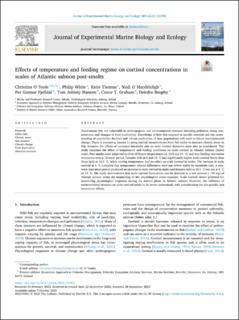| dc.contributor.author | O'Toole, Christina | |
| dc.contributor.author | White, Philip | |
| dc.contributor.author | Thomas, Katie | |
| dc.contributor.author | O'Maoiléidigh, Niall | |
| dc.contributor.author | Fjelldal, Per Gunnar | |
| dc.contributor.author | Hansen, Tom Johnny | |
| dc.contributor.author | Graham, Conor T. | |
| dc.contributor.author | Brophy, Deirdre | |
| dc.date.accessioned | 2024-01-11T09:10:30Z | |
| dc.date.available | 2024-01-11T09:10:30Z | |
| dc.date.created | 2023-11-07T13:57:45Z | |
| dc.date.issued | 2023 | |
| dc.identifier.citation | Journal of Experimental Marine Biology and Ecology. 2023, 569 . | |
| dc.identifier.issn | 0022-0981 | |
| dc.identifier.uri | https://hdl.handle.net/11250/3111013 | |
| dc.description.abstract | Anadromous fish are vulnerable to anthropogenic and environmental stressors including pollution, rising temperatures, and changes in food availability. Knowledge of how fish respond to specific stressors aid our understanding of population declines and inform predictions of how populations will react to future environmental change. There is increasing interest in using cortisol measurements from fish scales to measure chronic stress in fish, however the effects of increased metabolic rate on scale cortisol dynamics must also be considered. This study examines the effect of temperature and feeding conditions on scale cortisol in Atlantic salmon (Salmo salar). Post-smolts were subjected to three different temperatures (6, 10.5 and 15 °C) and four feeding/starvation treatments over a 12-week period. Females held at 6 and 15 °C had significantly higher scale cortisol levels than those held at 10.5 °C, while rearing temperature had no effect on scale cortisol in males. The increase in scale cortisol at 6 °C indicated that temperature related differences were not driven solely by metabolic rate. A two-week starvation period produced an increase in scale cortisol in males and females held at 10.5 °C but not at 6 °C or 15 °C. The study demonstrates that scale cortisol fluctuations can be detected in a low amount (∼10 mg) of Atlantic salmon scales for monitoring of the physiological stress response. Scale cortisol shows potential for monitoring physiological responses during the marine phase in Atlantic salmon. However, the influence of environmental stressors on scale cortisol needs to be better understood, with consideration for sex-specific and interactive effects. | |
| dc.language.iso | eng | |
| dc.title | Effects of temperature and feeding regime on cortisol concentrations in scales of Atlantic salmon post-smolts | |
| dc.title.alternative | Effects of temperature and feeding regime on cortisol concentrations in scales of Atlantic salmon post-smolts | |
| dc.type | Peer reviewed | |
| dc.type | Journal article | |
| dc.description.version | publishedVersion | |
| dc.source.pagenumber | 0 | |
| dc.source.volume | 569 | |
| dc.source.journal | Journal of Experimental Marine Biology and Ecology | |
| dc.identifier.doi | 10.1016/j.jembe.2023.151955 | |
| dc.identifier.cristin | 2193323 | |
| cristin.ispublished | true | |
| cristin.fulltext | original | |
| cristin.qualitycode | 1 | |
